SEO for lawyers is more than just a technical term – it’s the art and science of ensuring your law firm’s digital presence genuinely connects with those who need you most. It ensures your specialized legal services don’t just exist online, but appear prominently, almost as if by design, precisely when individuals turn to the internet for crucial legal guidance.
ABA Journal reports that more than 38 % of clients find their lawyer via online search, underlining the real impact of legal SEO. But SEO for attorneys isn’t just about visibility – it’s about being the trusted first choice. By diving into the nuances of SEO for attorneys, you’ll discover how to enhance your digital footprint, connect with clients actively searching for your expertise, and ultimately, elevate your search engine rankings.
Take some quick advice and read the full article to transform your online presence from a mere website into a powerful, client-attracting asset for your law firm:
- Research and target geo-specific, intent-driven keywords.
- Enhance on-page factors like title tags, meta descriptions, and structured data.
- Build focused landing pages for each service and location to match search intent.
- Create local authority through optimized Google Business Profiles and citations.
- Build authoritative backlinks from legal directories and partner sites.
This strategic approach to SEO for legal firms boosts online visibility, demonstrates trustworthiness, and drives client inquiries. It’s time to learn some nuances!

What is SEO for Lawyers?
At its core, SEO (Search Engine Optimization) for lawyers is all about getting the law firm’s website to be visible in search engine results. Think of it this way: when someone Googles “family law attorney” or “personal injury lawyer,” you want your firm to be right there at the top of the list.
It’s not just a single trick – SEO for legal professionals is a multi-faceted approach, which involves:
- Improving content, which means having clear, helpful, and keyword-rich information on your website itself. We’re talking about well-written service pages, informative blog posts, and clear calls to action.
- Enhancing technical setup, which is about the behind-the-scenes stuff that makes your site fast, secure, and easy for search engines to “read”. It includes things like mobile responsiveness and site structure.
- Building quality backlinks, which are essentially “votes of confidence” from other reputable websites that link to yours. The more high-quality backlinks you have, the more authoritative your site appears to search engines.
But here’s the really crucial part, especially for the legal field: SEO also builds trust. In law, trust isn’t just nice to have – it’s absolutely essential. A law firm with a well-optimized, informative website sends a powerful signal to search engines and potential clients that you’re an authority in your field and a credible choice. It shows you’re serious, knowledgeable, and reliable, which are all qualities clients are desperately looking for when they need legal help.
It’s about making sure that when clients are searching for answers, your firm isn’t just visible, but immediately stands out as a trustworthy guide.
Boost your law firm’s SEO and turn website visitors into clients with optimized landing pages from Landingi.
Why is SEO Important for Law Firms?
SEO is important for law firms as it helps them open their virtual doors to a vast audience actively seeking legal services. It increases the law firm’s website visibility and accessibility, enables targeted client acquisition, and builds credibility. SEO efforts make your website rank higher in SERPs, increasing the chances of being discovered by potential clients when they actively seek the legal services your company offers. This means the traffic coming to your website is highly qualified and more likely to convert into paying clients.
When your law firm ranks high in search results, it shows potential clients that your firm is reliable, trustworthy, and a leader in its area. People are more likely to trust the top results on Google. Good content, positive client reviews, and a well-designed website help build this credibility, which is very important in the legal field.
Many traditional ads offer an immediate, bright spark, but SEO crafts a deeper, more sustained glow. Yes, there’s an initial commitment of time and resources to get it going. However, that effort translates into a far greater return on investment over the long haul, consistently drawing in potential clients. It’s about building a robust online presence that continuously works for your firm.
A big part of effective SEO is making your law firm’s website truly user-friendly. When a potential client has a positive experience on your site – when it’s quick, easy to use, and genuinely helpful – they’re much more likely to stick around, significantly increasing the chances they’ll take the next step and contact your firm.
Simply put, law firm SEO is crucial to being found at the right moment, by the right people, and establishing your firm as the credible, go-to authority they can trust.
Get your law firm found online! Start building professional landing pages that convert.
How to Create an SEO Strategy for Law Firm Websites?
To create an SEO strategy for law firm websites, first optimize on–site and off–site SEO, then fix technical SEO issues, focus on local SEO, and analyze SEO performance to track keyword rankings, identify traffic sources, and adjust tactics based on conversion data and client acquisition metrics.
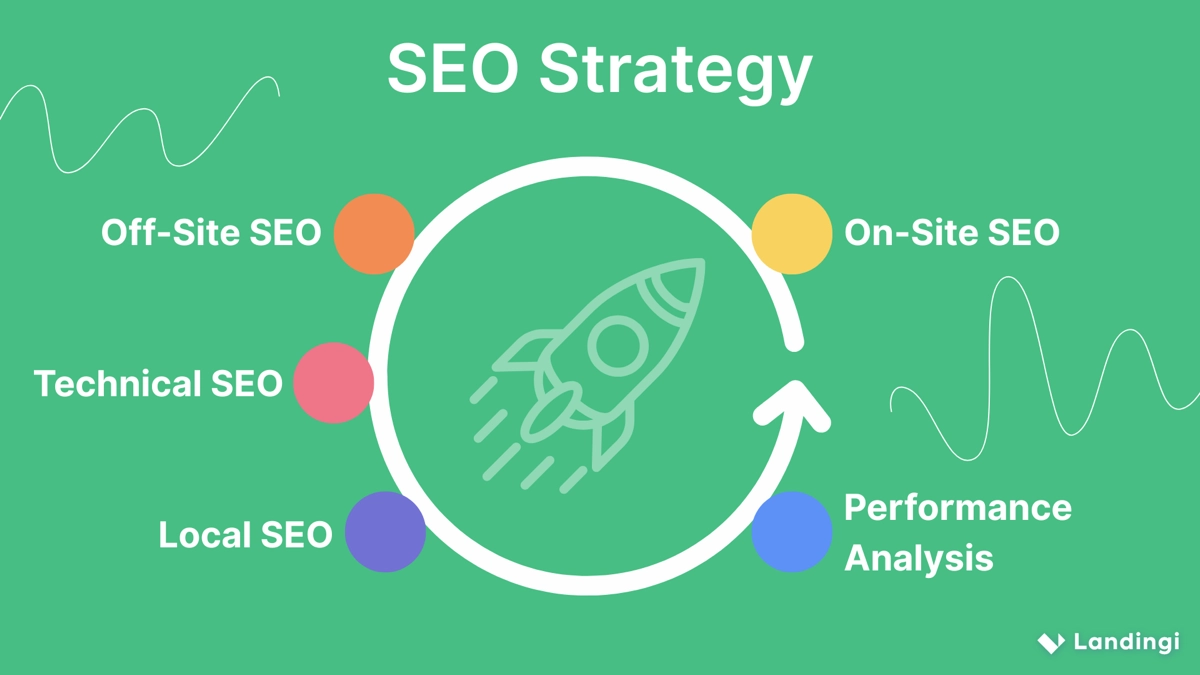
As mentioned earlier, the legal field demands trust, authority, and precision, so each lawyer aims to make their online presence reflect those values. Get ready to transform your online visibility from an afterthought into a powerful client-acquisition engine through targeted search engine optimization efforts – check out the following steps to build a robust strategy for your law firm’s website:
Optimize On-Site SEO
The foundation of your law firm’s online success begins right on your website, which means perfecting on-page SEO is a first step to ensuring search engines understand your content, highlight your legal expertise, and guide potential clients through a clear path to contact.
Essential elements of on-site SEO for law firms include:
- Clear keyword targeting,
- Optimized service pages,
- Structured data markup,
- Internal linking,
- Mobile-first design,
- Trust elements.
The most critical factor in on-page SEO optimization for lawyers is keyword targeting. You must understand the search intent behind a query a user types in a browser and ensure all the essential pages and blog posts within your website are filled with relevant, legal service-specific keywords. Each legal service you offer should have a dedicated, keyword-focused page to align with search queries and increase topical relevance.
Capture more leads for your law firm with SEO-optimized, relevant landing pages.
Beyond individual page optimization, internal linking is a pivotal strategy. By thoughtfully connecting your site’s pages – weaving links between your different practice areas, helpful blog posts, and essential contact pages – you’re doing three powerful things:
- Distributing authority by telling search engines which of your pages are most important and sharing that crucial “link juice” around your site.
- Improving user navigation by making it easy for visitors to explore your expertise and find related information.
- Aiding indexation by helping search engines discover and understand all the valuable content your firm offers, ensuring nothing gets missed.
Keep in mind the data from Statista: by the end of 2024, a significant 62.54% of all global website traffic came directly from mobile phones. Therefore, you should ensure your site loads fast and functions well on mobile devices to meet users’ expectations and increase the likelihood of attracting and converting potential clients who are searching for legal services on the go.
Improve Off-Site SEO
While on-site SEO focuses on what’s on your website, off-site SEO concerns itself with external factors that influence your website’s ranking. For law firms, this largely revolves around establishing rock-solid credibility and undeniable authority across the web.
The cornerstone of this effort is link building. When a respected legal directory, an industry publication, or another highly relevant and authoritative website links to your firm, it tells search engines, “Hey, this law firm knows its stuff and is a trustworthy resource!” These signals are incredibly powerful, pushing your site higher in the rankings – but only when your backlinks meet the four criteria: the referring website has strong domain authority, consistent traffic, healthy backlink profile, and is relevant.
Therefore, your strategic focus should be to actively secure valuable backlinks. This means earning links from legal directories, industry publications, or other relevant websites. By building a strong profile of high-quality backlinks, you’re not just improving your SEO but building a digital reputation that resonates with both search engines and potential clients looking for reliable legal expertise.
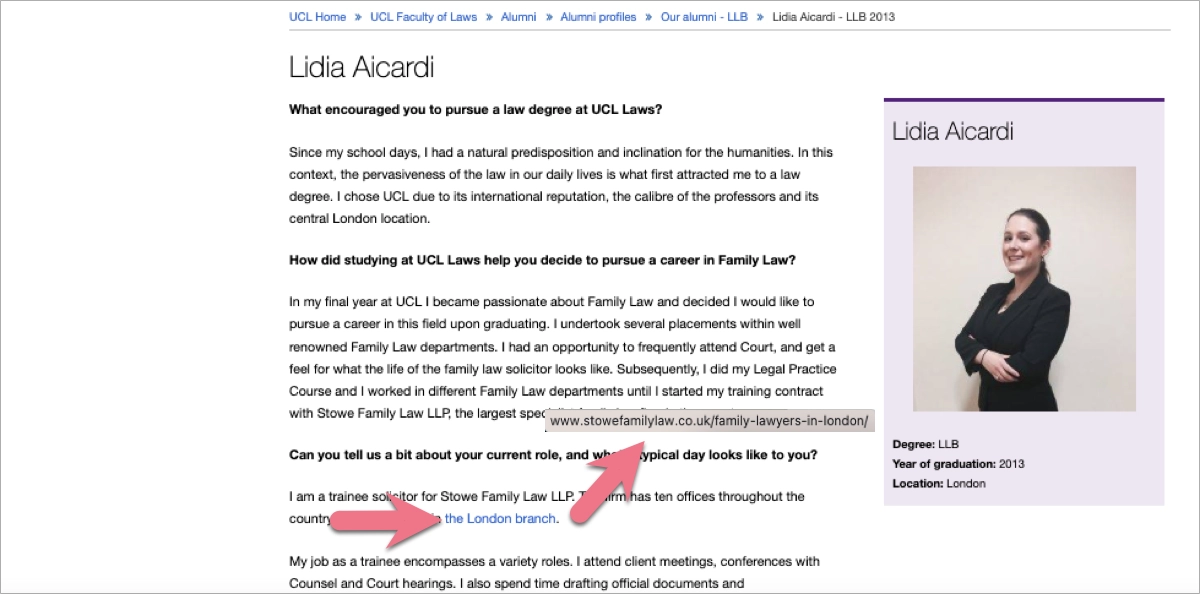
Off-site SEO also refers to reputation management and social media presence. Positive reviews and frequent posting on social platforms show search engines that your firm is active and engaged, which helps build your authority and visibility.
Fix Technical SEO Issues
Beyond what users see and what other sites say about you, there’s a vital layer of SEO that ensures search engines can properly “read” and understand your law firm’s website: technical SEO. The common technical issues that need attention include:
- Site speed,
- Mobile-friendliness,
- Crawlability & indexability,
- Broken Links & redirects,
- Schema markup.
Most of these you can discover by using professional tools for site audits, such as Screaming Frog SEO Spider. It crawls your website and creates transparent reports to enable efficient detection of broken links, duplicate content, missing tags, and structural issues that affect your site’s SEO performance.
Paying close attention to metrics like Core Web Vitals (Google’s benchmarks for page experience) is crucial here. By addressing these technical aspects, you’ll improve your search engine standing and guarantee a seamless and professional experience for every potential client who visits your website.
Your legal practice deserves the best! Build high-performance pages and enhance SEO with Landingi.
Build Local SEO
Many potential clients for law firms are typically found nearby, so it’s essential for them to connect with this local audience by employing effective local SEO strategies.
Imagine making your firm effortlessly discoverable to neighbors actively searching for legal help – that’s your aim. The essentials for achieving this hyper-targeted online visibility include:
- Mastering your Google Business Profile (listing that pops up in Google Maps and the prominent “local pack” when someone searches for a “lawyer near me”). It’s about ensuring every detail is perfected – from accurate contact information and specific practice areas to compelling photos and consistent updates.
- Achieving NAP consistency, which is about ensuring the name, address, and phone number (NAP) are the same across every online platform. Any discord or inconsistency in these details can confuse search engines and hinder your local reach.
- Populating relevant local directories to ensure your firm is easily found. Each local business listing serves as a guide, helping clients find you.
- Cultivating client testimonials, as these genuine endorsements significantly amplify your local visibility and build the trust crucial in the legal field.
- Weaving in local keywords, or, in other words, embedding location-specific terms into your website content to connect your expertise directly with local searches.
By perfecting your local SEO, you ensure that when someone in your community needs legal assistance, your firm is not just visible but also an obvious, trusted choice right in their area.
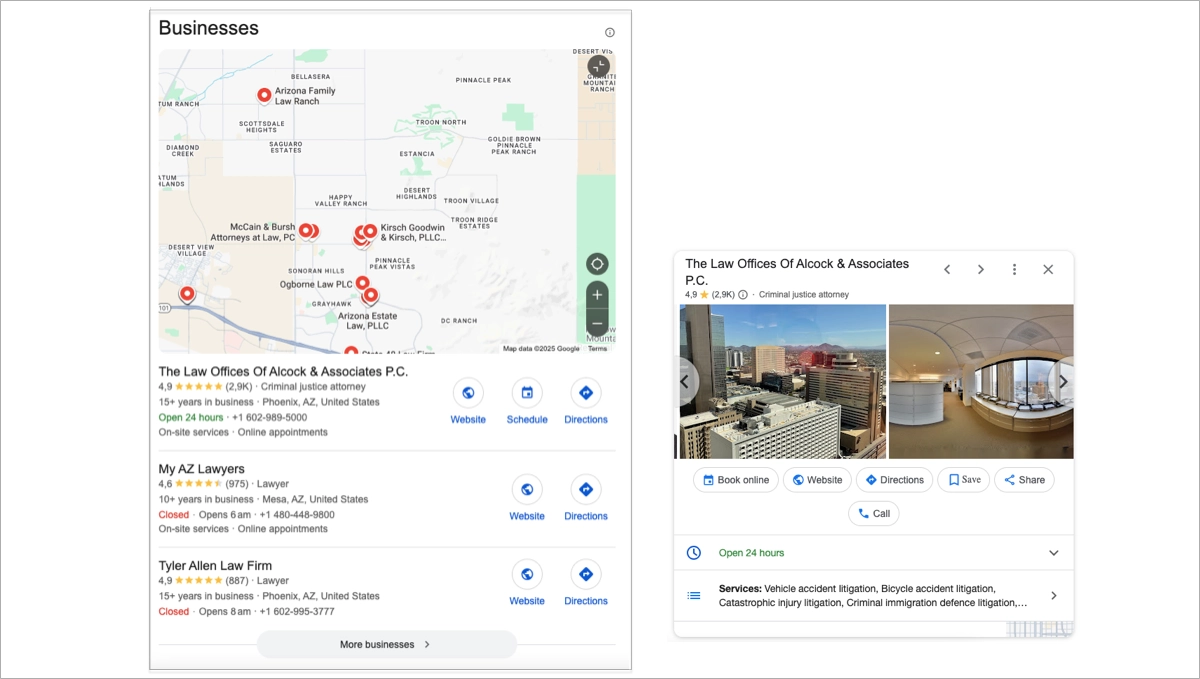
Monitor and analyze SEO performance
Finally, to truly achieve SEO success, remember that your work isn’t done once your optimizations are in place. The digital environment constantly shifts, and effective legal SEO demands continuous monitoring and analysis.
Think of it as navigating a ship: you need to check your compass and adjust your course constantly. For law firms, this means regularly tracking:
- Website traffic: Are more people visiting your site?
- Keyword rankings: Where do you show up for critical legal terms?
- Conversion rates: Are visitors contacting your firm or filling out forms?
- Backlink profile growth: Are you consistently gaining valuable links?
- User behavior: How are visitors interacting with your pages?
Tools like Google Analytics and Google Search Console are invaluable here, providing the data needed to understand what’s working and what isn’t. But to track actual user interactions on your landing pages, you’d need a professional toolkit. Landingi, a landing page automation platform, offers a built-in EventTracker tool that gives you valuable insights on microconversions and user behavior on your landing pages. By consistently analyzing these metrics, you can identify new opportunities, address any issues quickly, and ensure your SEO ranking factor remains strong, continually refining your strategy for optimal client acquisition.
Maximize your law firm’s visibility and conversions! Start using EventTracker for your pages today.
How Do You Do SEO Keyword Research for Law Firms?
To do SEO keyword research for your law firm, begin by identifying the core legal services you offer and the cities or regions you serve. Combine these terms to find relevant keywords that your potential clients use when searching for help, such as “car accident lawyer in [city]” or “immigration attorney near me” – these are the direct pathways clients will take to find you. Remember: to truly connect with those who need your legal expertise, you first need to understand the language they use when they turn to a search engine.
Next, it’s time to leverage the right tools. Platforms like Google Keyword Planner, Ahrefs, or Semrush become your navigators, helping you estimate how often these target keywords are searched, how competitive they are, and, crucially, the underlying intention behind each search. You’ll want to uncover informational queries (when users are learning), navigational queries (when they’re looking for a specific firm), and transactional queries (when they’re ready to engage).
By prioritizing relevant keywords that perfectly blend your firm’s specialties with your geographic coverage, you boost your law firm’s website visibility. Effective keyword research isn’t just about finding words but about aligning your content directly with the needs of real people and positioning your firm to outshine the competition. When you speak the client’s language, your pages can naturally ascend in search results, attracting more qualified leads to your digital doorstep.
How Much Does a Law Firm SEO Cost?
According to SeoProfy’s statistics, most law firms pay between $5,000 and $9,500 monthly for SEO services, while some companies spend even more, depending on firm size, market competition, practice area, geographic location, and the scope of services required.
Small firms operating in less competitive markets typically invest up to $3,500 per month in SEO efforts, while the big players, particularly in major cities or specialized practice areas, can easily pour $10,000 to over $20,000 per month into their robust SEO strategies.
These investments typically cover a range of essential services designed to elevate a firm’s online presence. This includes crucial elements like website technical optimization, fresh content creation and optimization, strategic link building and citation management, in-depth analytics and reporting, and continuous ongoing strategy management. And, of course, a significant portion is dedicated to Local SEO. If your primary focus is to dominate your local market, you should expect to pay between $1,500 and $2,300 monthly for a single location to ensure your firm is found by clients right in your neighborhood.
Given the undeniable shift in how clients find legal help, investing in SEO for your law firm isn’t just an expense – it’s a critical, high–return investment that ensures your firm‘s future visibility and growth in a digitally driven world.
Why is Local SEO Important for Law Firms?
Most individuals seeking legal help look for an attorney in their immediate area, making it crucial for your firm to appear prominently in local search results; therefore, for law firms, Local SEO isn’t just an option, it’s a fundamental necessity.
Effective local SEO strategies ensure that when potential clients in your community search for services like “personal injury lawyer in [city]” or “divorce attorney near me”, your firm stands out. By optimizing your online presence for local visibility, you increase your chances of attracting highly qualified leads who are ready to engage, driving more direct inquiries, and cementing your position in both the organic search results and the local legal market. This targeted approach is a cornerstone of successful lawyer SEO.
Capture more leads for your law firm with optimized landing pages from Landingi.
How to Choose the Right Local SEO Services for Law Firms?
To choose the right local SEO services for law firms, evaluate providers based on their track record with legal clients, understanding of legal search intent, and ability to deliver local visibility improvements. A credible agency should show case studies or reviews demonstrating results for law firms in your practice area or geographic market.
A great law firm SEO partner will emphasize transparent communication, ethical strategies, and a tailored approach, ensuring their efforts align with your firm’s specific geographic reach and practice areas. You should prioritize law firm SEO services that include full Google Business Profile optimization, citation building, local content creation, and link acquisition from trusted legal and local sources. These are core actions that influence map pack rankings and geo-targeted queries.
Choosing the right local SEO services for law firms is about finding a true digital ally, not just a vendor. The point is to find a law firm SEO agency that deeply understands the unique ethical considerations and competitive nuances of the legal field, beyond generic marketing.
What’s the Importance of Landing Pages in SEO for Law firms?
Landing pages are essential in law firm SEO because they improve visibility in search engine results pages, align with specific legal services, and convert prospective clients. Each landing page can target a distinct legal query and location, increasing topical relevance and improving conversion paths.
While your main website might offer a broad overview of your firm, a landing page is hyper-focused: it addresses a specific need, offers a precise solution, and guides the user toward a single, clear action. In the competitive legal services market, this targeted approach is essential for capturing leads directly from search engine results pages.
Imagine a potential client searching for “divorce lawyer [city]”. Instead of landing on your general homepage, a dedicated landing page about divorce law in that specific area, complete with a clear call to action, dramatically increases the likelihood of conversion.
However, to create effective landing pages, you need the right tool. Landingi is a landing page automation platform that helps you improve this process. Law firms can use pre-built templates designed for legal niches or leverage Composer, the AI-driven tool that generates appealing page layouts and engaging copy based on user requirements. This way or another, customization options in an intuitive drag-and-drop editor let users craft unique, conversion-focused pages without coding and design expertise.

Landingi automatically fine-tunes the mobile view of your page, providing a seamless experience for both desktop and mobile users. This adjustment helps meet one of Google’s ranking criteria. Additionally, with the help of the AI Assistant, you can easily create SEO-friendly content for your entire page, along with relevant titles and descriptions, ensuring everything is optimized for search engines.
Advanced features like Smart Sections allow legal marketers to update multiple pages at once, while the Form Builder ensures smooth client intake. Multi-language support and personalization are key for larger firms targeting diverse markets. Additionally, built-in EventTracker and A/B testing help analyze performance and optimize for higher conversion. These tools make Landingi a powerful platform for law firms seeking scalable, high-performing SEO landing pages.
In essence, landing pages, especially when powered by a robust platform like Landingi, are not just about showing up in search results; they’re about creating a highly optimized, frictionless path for potential clients to connect with your firm and secure the legal help they need.
Get more clients with less effort! Build SEO-friendly, conversion-optimized pages for your law firm.
What are the Best Law Firm SEO Tools?
The best law firm SEO tools include analytics and performance tracking tools, like Google Analytics and Google Search Console, technical SEO tools for site audits, like Screaming Frog SEO Spider, keyword research and rank tracking tools, such as Semrush, landing page builders, like Landingi, and listings management tools, including Google Business Profile.
All these tools included in a lawyer’s SEO toolkit ensure your firm can precisely measure, refine, and accelerate its online growth, transforming digital visibility into tangible client connections and sustained success. Check out how these tools can empower your firm to dominate search results:
Analytics Tools
To effectively steer your law firm’s SEO strategy, you need to know exactly what’s working and what’s not, and that’s where powerful analytics tools come into play. The absolute champions in this arena are Google Analytics and Google Search Console. Google Analytics is your comprehensive dashboard for understanding client behavior on your site: it reveals how many visitors you’re attracting, where they come from (including precise locations), which pages they engage with most, and how long they stay.
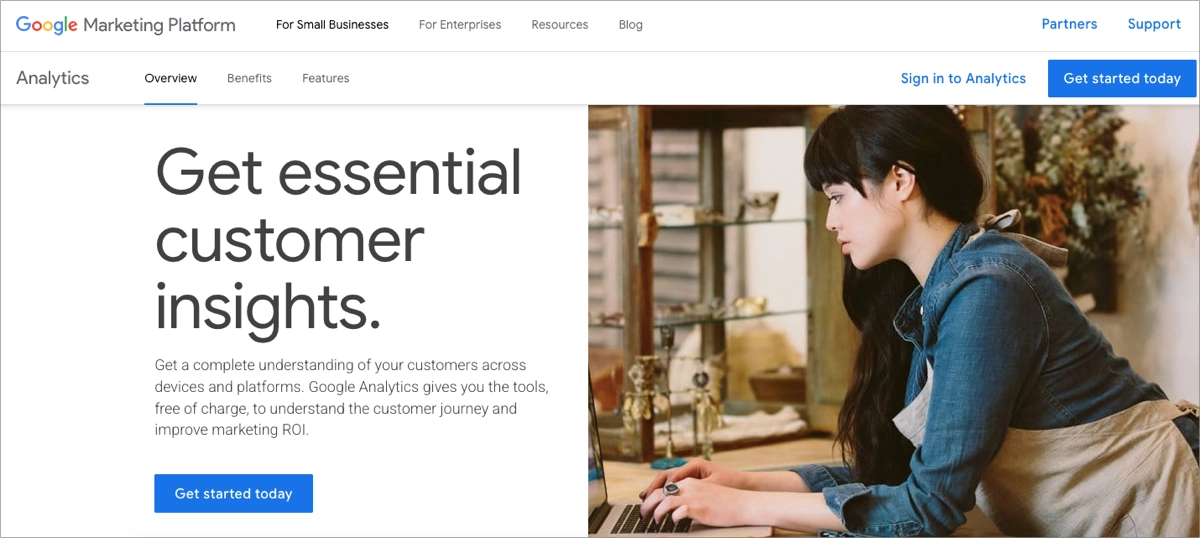
Google Search Console, on the other hand, offers a deeper dive into how Google itself perceives your website, showing you which keywords bring users to your site, your actual search rankings, any technical issues preventing proper indexing, and even which specific pages are appearing in search results. Together, these free yet incredibly powerful tools provide the essential data to fine-tune your firm’s online presence, ensuring your SEO efforts consistently connect you with the right clients.
Site Audits Tools
For any law firm serious about its online visibility, performing thorough website audits is non-negotiable. This is where tools like Screaming Frog SEO Spider become indispensable. It uncovers crucial technical issues that could be silently hindering your visibility, such as broken links, duplicate content, slow-loading pages, or incorrect redirects.
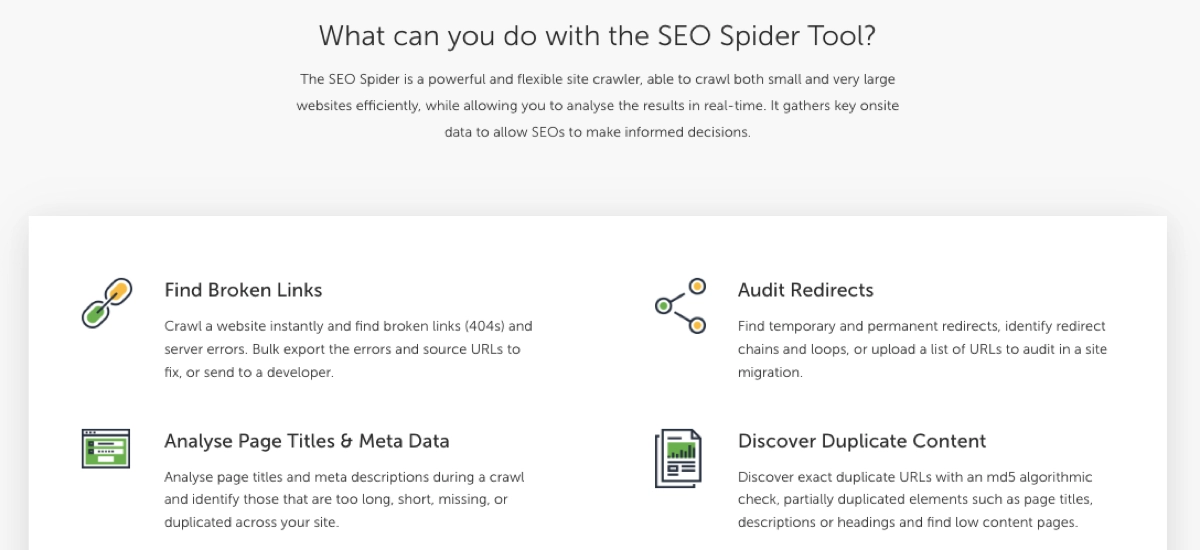
By identifying and addressing these often-hidden problems, Screaming Frog helps ensure your site is perfectly structured and technically sound, providing a seamless experience for potential clients and the search engine algorithms evaluating your expertise. The tool offers a free plan for basic needs, but for more advanced features and unlimited crawls, you’d have to switch to a paid plan – it costs $279 per year.
Keyword Research Tools
Once you have your site in top technical shape, you need to understand what phrases people are actually typing into search engines to find legal help. This is where dedicated keyword research tools like Semrush are needed.
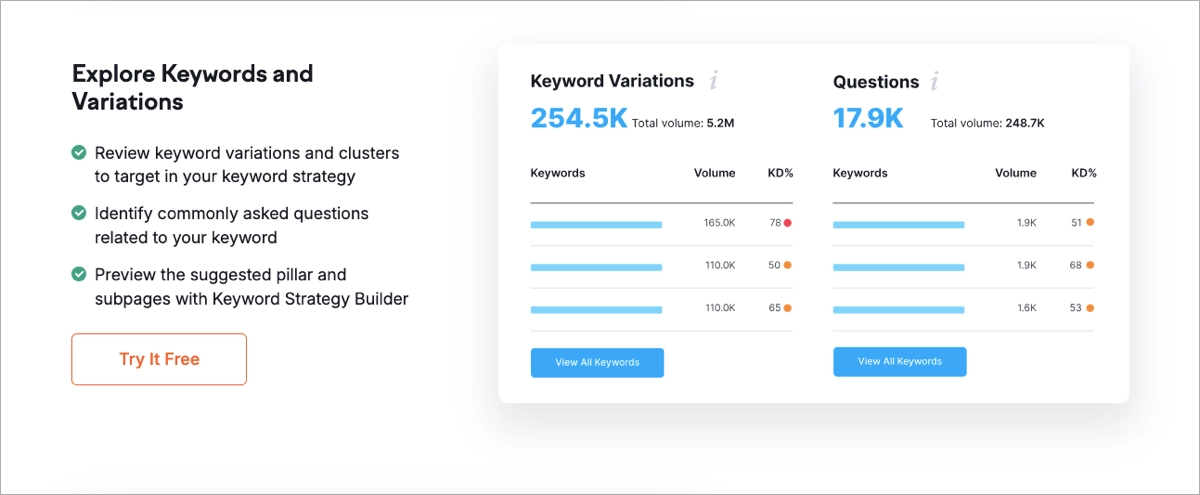
Semrush is a comprehensive platform that allows you to dig deep into the minds of your potential clients. The Pro Plan, including keyword research and competitor analysis tools, costs around $140 monthly, so it’s quite expensive, but undoubtedly worth the investment. You can uncover not only high-volume keywords related to your specific practice areas but also discover valuable long-tail phrases that indicate higher intent.
Beyond simply suggesting keywords, Semrush provides crucial data points like search volume, keyword difficulty, and even the search intent behind a query. What’s more, it allows you to analyze your competitors’ keyword strategies, revealing
terms they rank for that you might be missing. Using Semrush, you can strategically craft content that directly answers client questions, ensuring your online presence is precisely tuned to attract the right users.
Landing Page Tools
However, securing those high rankings is only half the battle – the next crucial step is converting visitors into clients. This is where Landingi emerges as an exceptional choice for law firms. It empowers your firm to swiftly create highly focused, conversion-optimized pages designed to capture leads.
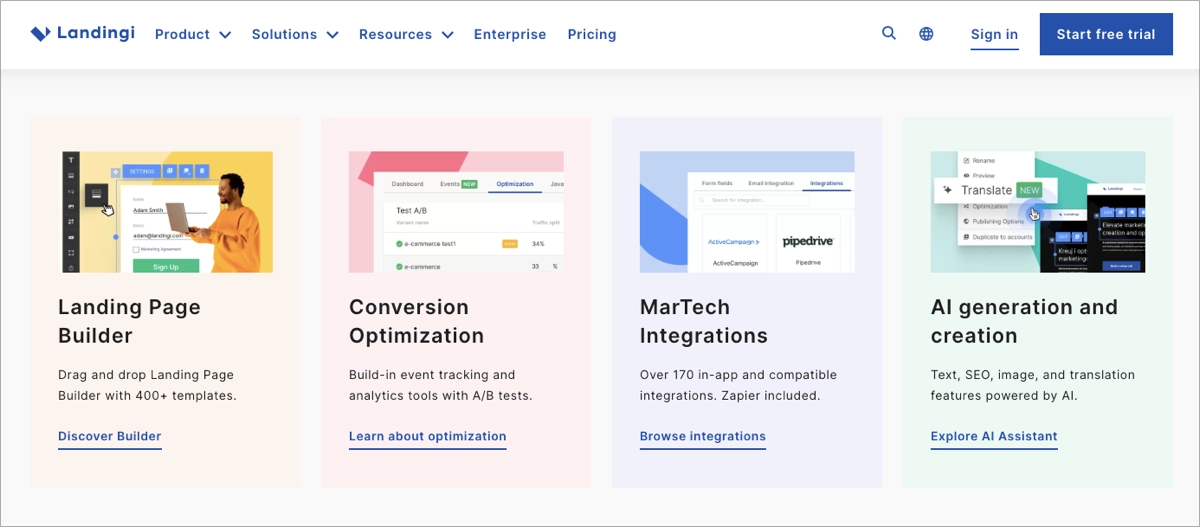
Forget generic web pages – with Landingi, you can craft dedicated pages for specific legal services or campaigns, complete with intuitive forms and clear calls to action. It’s about ensuring that every click from a search result directly leads a potential client to the precise information they need, making the transition from interested visitor to prospective client as smooth and effective as possible. Landingi is especially valuable for law firms aiming to quickly launch targeted landing pages for different practice areas, campaigns, or lead magnets, and to optimize those pages for both SEO and conversions.
The platform offers a Free Plan, which is perfect for creating first pages and trying out all features. For larger needs, it offers three pricing plans, starting from $24 per month.
Listings Management Tools
When it comes to local visibility, your Google Business Profile is your firm’s most powerful storefront. This free, yet incredibly influential, tool allows you to manage your law firm’s presence on Google Maps and local search, and control the crucial information prospective clients see at a glance: your address, phone number, hours, and those all-important client reviews.
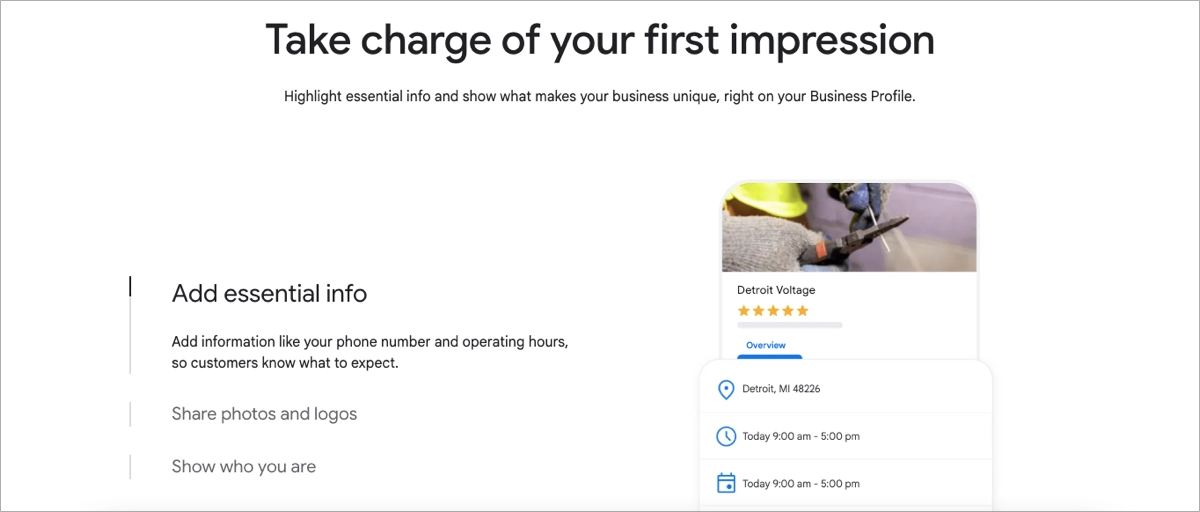
By meticulously completing and regularly updating your Google Business Profile with accurate details, compelling photos, and engaging posts, you empower your firm to be discovered by individuals actively searching for legal help right in their neighborhood.
To make it crystal clear why you should use these tools, check out the table below:
| Tool | Primary Use | Notable Features | Price |
|---|---|---|---|
| Google Analytics | Analytics & performance tracking | User behavior, conversion tracking | Free |
| Google Search Console | Indexing, keyword, technical monitoring | Search queries, indexing, error alerts | Free |
| Screaming Frog SEO Spider | Technical SEO auditing | Site crawl, error detection | Free plan, paid plans from $279/year |
| Semrush | All-in-one SEO Suite, keyword ideas | Keyword research, competitor analysis | Paid plans from ca. $140/month |
| Landingi | Landing page creation & optimization | Drag-and-drop, AI, A/B testing, legal templates, analytics | Free plan, paid plans from $24/month |
| Google Business Profile | Local SEO | Local listing, review management | Free |
What are the Limitations of SEO for Law Firms?
While incredibly powerful for connecting law firms with potential clients, the journey of SEO for legal practices does come with its unique set of challenges, like intense competition for highly sought–after legal keywords or navigating the strict ethical advertising guidelines set by bar associations. The legal market, particularly for high-stakes cases or in bustling urban centers, is fiercely competitive. This means climbing to the top of search results isn’t an overnight sprint but a real marathon demanding consistent effort, strategic patience, and a steady investment.
Moreover, every move in attorney search engine optimization must dance in harmony with the strict ethical advertising guidelines set by bar associations. These are non-negotiable rules, meaning your content must always be unequivocally accurate, genuinely informative, and steer clear of anything that could be perceived as misleading. The digital rulebook is also constantly being rewritten by search engine algorithms, requiring a perpetual commitment to learning, adapting, and refining your approach. Despite these hurdles, SEO is an unparalleled long-term investment for cultivating sustainable client growth and solidifying your firm’s online legacy.
From ranking to client acquisition! Use Landingi to create landing pages that boost your law firm’s SEO.
Use SEO for Law Firms to Improve Traffic on Your Landing Pages
Harnessing SEO for law firms is absolutely essential for increasing the visibility and effectiveness of your dedicated landing pages. By meticulously aligning your content with what users are actually searching for and perfecting those crucial technical factors, you’re empowered to capture far more qualified traffic, transforming page visits into valuable consultations.
A well-structured SEO strategy keenly focused on pinpoint keyword relevance, robust local visibility, and conversion-oriented design is what helps legal websites genuinely stand out in today’s competitive digital environment. From optimizing page load speed to refining your content’s structure for maximum impact, SEO for law firm websites empowers you to build profound trust and drive consistently measurable results. Furthermore, leveraging legal SEO specifically across your landing pages not only enhances your reach but also solidifies your authority in the eyes of both search engines and potential clients.
In a market where first impressions are paramount, SEO for attorneys ensures your firm appears credible and accessible, allowing for a consistent, strong brand presence across all your practice areas. Ultimately, SEO for legal firms isn’t just about rankings: SEO success means business growth – try Landingi now and build optimized pages to reach potential clients and transform your online presence into a powerful client-acquisition engine.






